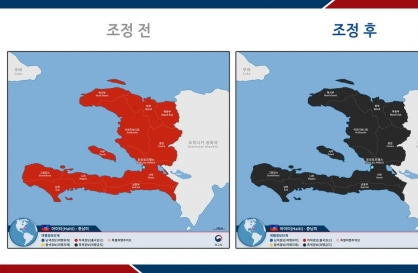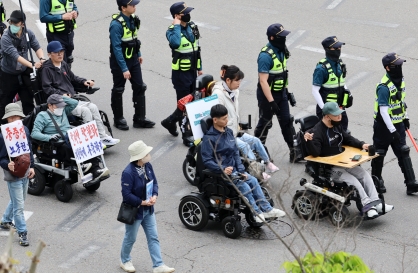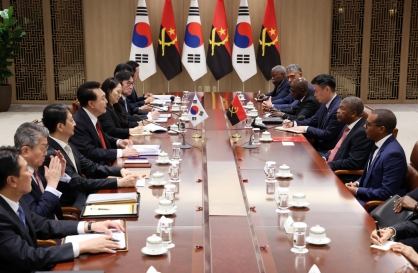S. Korea should seek nuclear summit balance between U.S., China: experts
By Korea HeraldPublished : March 8, 2012 - 19:47
Ensuring nuclear safety and security on Northeast Asia critical for S. Korea
U.S. President Barack Obama and Chinese President Hu Jintao are among the 52 state heads visiting South Korea for the Seoul Nuclear Security Summit in March.
South Korea, as the host of the summit, should seek a cautious balance between the U.S. and China because the G2 powers have slightly different stances on the use of nuclear energy and materials, experts said.

The U.S., the world’s largest nuclear power, has 104 nuclear energy plants which produce 30 percent of the world’s total nuclear energy output, and 20 percent of the United States’ electricity.
Despite its prowess in nuclear energy, the U.S. has for more than 30 years refrained from building a new nuclear power plant since the Three Mile Island accident in 1979.
Although the Obama administration had planned to allow construction of two new nuclear power plants in Georgia as part of efforts to reduce carbon emissions when it took office in 2008, the overall business sentiment of the nuclear industry in the U.S. turned negative after the earthquake and tsunami that crippled the Fukushima power plant in Japan on March 11.
Obama announced his vision for a world without nuclear weapons and nuclear terrorism threats in April, 2009, during a speech in Prague, and the U.S. held the first Nuclear Security Summit in Washington in 2010.
“The Nuclear Security Summit process helps strengthen President Obama’s nonproliferation agenda and reduce the risk of nuclear terrorism,” said Ambassador Bonnie Jenkins, the U.S. Department of State coordinator for threat reduction programs, on the U.S. government’s webpage dedicated to the 2012 Nuclear Security Summit.
“The United States welcomes the opportunity to engage the international community at the summit on this important challenge,” she said.
In contrast, China is ambitiously pushing to increase nuclear reactors to meet rapidly-growing energy demand and to tackle environmental issues such as air pollution from the use of fossil fuels.
According to the International Energy Association, China’s energy consumption surged 40 percent from 2004 to 2009 and its electricity demand 70 percent during the same period.
As of the end of 2011, China has 14 nuclear reactors in operation, 25 under construction, and another 50 to be added in the future. By 2030, China is expected to possess some 100 nuclear power plants and possibly become the world’s largest nuclear energy producer.
For now, however, China’s nuclear industry is much smaller than that of the U.S., which is why China is trying to catch up, experts said.
“China is eager to catch up with the U.S. in terms of arms and the nuclear race but it will not be able to explicitly show its intent. While the U.S. really welcomes the upcoming Seoul Nuclear Security Summit, China’s stance may be very subtle,” said Yu Suk-ryul, professor emeritus at the Institute of Foreign Affairs and National Security.
“China will of course agree on a consensus of world leaders at the upcoming meeting because it is a large-sized summit. But it may interpret details in their own way when it goes deeper,” he said.
How the relations of the U.S. and China will develop will affect South Korean diplomacy and North Korean nuclear issues, Yu said, adding that China was currently in a very uncomfortable position over the North Korean defector issue.
From a Chinese viewpoint, Beijing is more interested in whether Pyongyang will be able to maintain its regime or not than in whether Pyongyang will give up its nuclear ambitions, he said.
The U.S. and the nuclear watchdog in the international community, however, are interested in getting nations to move away from nuclear threats, he said.
While the U.S. is expected to seek to reaffirm its existing stance on promoting nuclear security to prevent nuclear materials from getting into the hands of terrorists, China and Japan will likely put more focus on securing the safety of nuclear power plants at the upcoming Seoul summit, an expert said at a recent forum in Seoul.
“The issue here for South Korea will be how to find a balance between possible benefits from a stronger U.S.-Korea alliance through the implementation of the U.S. agenda as it is and other benefits from talks on nuclear safety with China and Japan,” international relations professor Shin Seong-ho from the Graduate School of International Studies said at the East Asia Institute’s forum on the Seoul Nuclear Security Summit.
Regarding the nuclear security issue on the Korean Peninsula, Kim Tae-hyun, professor at the Graduate School of International Studies at Chung-Ang University, said participating countries may bring up the issue of safely securing nuclear materials in North Korea, although the North Korea’s nuclear weapons program is not the official agenda of the Seoul summit.
“It could be possible that countries raise concerns about management of nuclear materials in North Korea,” Kim said.
By Kim Yoon-mi (yoonmi@heraldcorp.com)
U.S. President Barack Obama and Chinese President Hu Jintao are among the 52 state heads visiting South Korea for the Seoul Nuclear Security Summit in March.
South Korea, as the host of the summit, should seek a cautious balance between the U.S. and China because the G2 powers have slightly different stances on the use of nuclear energy and materials, experts said.

The U.S., the world’s largest nuclear power, has 104 nuclear energy plants which produce 30 percent of the world’s total nuclear energy output, and 20 percent of the United States’ electricity.
Despite its prowess in nuclear energy, the U.S. has for more than 30 years refrained from building a new nuclear power plant since the Three Mile Island accident in 1979.
Although the Obama administration had planned to allow construction of two new nuclear power plants in Georgia as part of efforts to reduce carbon emissions when it took office in 2008, the overall business sentiment of the nuclear industry in the U.S. turned negative after the earthquake and tsunami that crippled the Fukushima power plant in Japan on March 11.
Obama announced his vision for a world without nuclear weapons and nuclear terrorism threats in April, 2009, during a speech in Prague, and the U.S. held the first Nuclear Security Summit in Washington in 2010.
“The Nuclear Security Summit process helps strengthen President Obama’s nonproliferation agenda and reduce the risk of nuclear terrorism,” said Ambassador Bonnie Jenkins, the U.S. Department of State coordinator for threat reduction programs, on the U.S. government’s webpage dedicated to the 2012 Nuclear Security Summit.
“The United States welcomes the opportunity to engage the international community at the summit on this important challenge,” she said.
In contrast, China is ambitiously pushing to increase nuclear reactors to meet rapidly-growing energy demand and to tackle environmental issues such as air pollution from the use of fossil fuels.
According to the International Energy Association, China’s energy consumption surged 40 percent from 2004 to 2009 and its electricity demand 70 percent during the same period.
As of the end of 2011, China has 14 nuclear reactors in operation, 25 under construction, and another 50 to be added in the future. By 2030, China is expected to possess some 100 nuclear power plants and possibly become the world’s largest nuclear energy producer.
For now, however, China’s nuclear industry is much smaller than that of the U.S., which is why China is trying to catch up, experts said.
“China is eager to catch up with the U.S. in terms of arms and the nuclear race but it will not be able to explicitly show its intent. While the U.S. really welcomes the upcoming Seoul Nuclear Security Summit, China’s stance may be very subtle,” said Yu Suk-ryul, professor emeritus at the Institute of Foreign Affairs and National Security.
“China will of course agree on a consensus of world leaders at the upcoming meeting because it is a large-sized summit. But it may interpret details in their own way when it goes deeper,” he said.
How the relations of the U.S. and China will develop will affect South Korean diplomacy and North Korean nuclear issues, Yu said, adding that China was currently in a very uncomfortable position over the North Korean defector issue.
From a Chinese viewpoint, Beijing is more interested in whether Pyongyang will be able to maintain its regime or not than in whether Pyongyang will give up its nuclear ambitions, he said.
The U.S. and the nuclear watchdog in the international community, however, are interested in getting nations to move away from nuclear threats, he said.
While the U.S. is expected to seek to reaffirm its existing stance on promoting nuclear security to prevent nuclear materials from getting into the hands of terrorists, China and Japan will likely put more focus on securing the safety of nuclear power plants at the upcoming Seoul summit, an expert said at a recent forum in Seoul.
“The issue here for South Korea will be how to find a balance between possible benefits from a stronger U.S.-Korea alliance through the implementation of the U.S. agenda as it is and other benefits from talks on nuclear safety with China and Japan,” international relations professor Shin Seong-ho from the Graduate School of International Studies said at the East Asia Institute’s forum on the Seoul Nuclear Security Summit.
Regarding the nuclear security issue on the Korean Peninsula, Kim Tae-hyun, professor at the Graduate School of International Studies at Chung-Ang University, said participating countries may bring up the issue of safely securing nuclear materials in North Korea, although the North Korea’s nuclear weapons program is not the official agenda of the Seoul summit.
“It could be possible that countries raise concerns about management of nuclear materials in North Korea,” Kim said.
By Kim Yoon-mi (yoonmi@heraldcorp.com)
-
Articles by Korea Herald



















